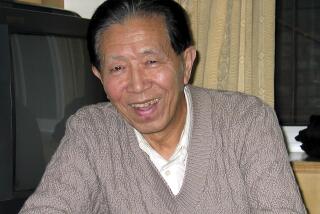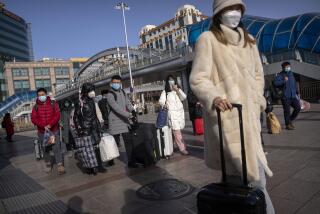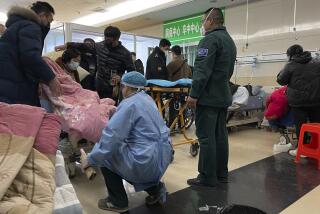Doctors and nurses fighting coronavirus in China die of both infection and fatigue
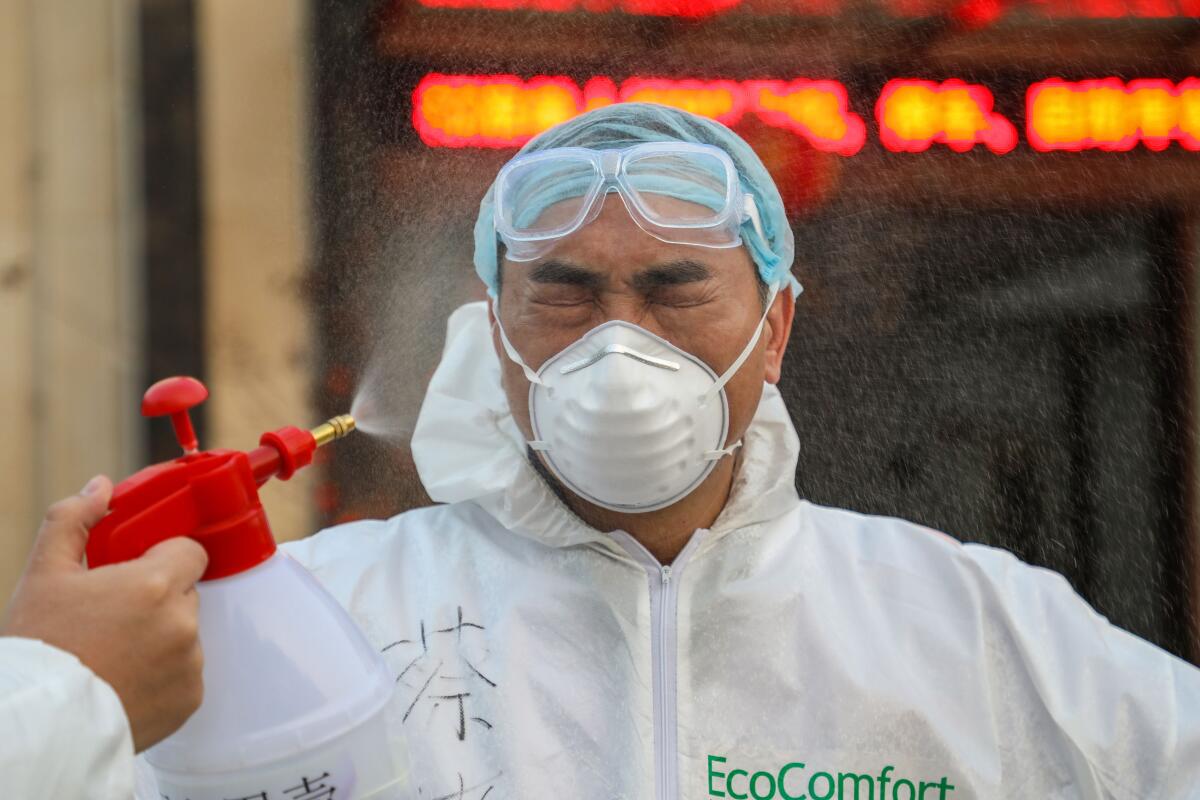
- Share via
BEJING — Sudden pain pierced through the anonymity of hazmat suits and protective masks as a woman in full medical gear chased a black funeral van, letting out a faceless howl.
Her husband, Liu Zhiming, director of Wuhan’s Wuchang Hospital and a respected neurosurgeon who’d led the institution’s coronavirus response, was inside the vehicle. A video of the anguished moment went viral, showing Liu’s wife, Cai Liping, a nurse who had been on the front lines with him, staggering forward, arms outstretched, watching as his corpse was driven away to be cremated.
Cai had begged to take care of Liu after he became infected in late January, when thousands of patients began crowding into Wuhan’s overburdened hospitals. But he refused, fearing she would get sick too. He even kept her away when he was moved to intensive care.
“Can you see my messages? Can I come take care of you?” she texted him from outside his ward. “If you’re scared how about if I come stay with you?”
“No,” Liu wrote.
Liu died on Feb. 18.
A spate of recent deaths at China’s coronavirus epicenter highlights how COVID-19 has strained medical workers struggling to stem an outbreak that has killed more than 2,700 people and infected more than 80,000 worldwide. Chinese health authorities and a team from the World Health Organization reported Monday evening that 3,387 health workers in China had been infected with COVID-19, more than 90% of whom were in Hubei province, the outbreak’s ground zero.
The rate of new infections and deaths overall appears to be slowing in China. But the toll on medical workers reflects the harrowing costs of a politically delayed response that overwhelmed Wuhan and surrounding Hubei’s healthcare systems. Hospital staffer were left underprotected, overworked and increasingly vulnerable, even as they became the nexus between a frightened public and a misdirected government.
State propaganda has glorified their sacrifices, and on Saturday authorities announced measures to bolster support for medical workers, including higher salaries and a “martyr” title for the deceased. But their deaths and infections have sparked criticisms that the Communist Party has not taken responsibilities for shortcomings that allowed the spread of the virus to accelerate.
The Times counted at least 18 reported deaths of medical workers involved in the COVID-19 response as of Monday, including nurses and doctors who died not because of infection but because of cardiac arrest or other ailments due to overwork and fatigue. One victim was hit by a car while taking temperatures on a highway.
The most recent were three doctors who died in one day, all infected with COVID-19. One of them, Xia Sisi, a gastroenterologist in Wuhan, was 29. Another physician, Peng Yinhua, also 29, died in Wuhan of infection on Feb. 20. He had delayed his Feb. 1 wedding, promising his pregnant fiancee they’d have the ceremony after the outbreak had passed.
Most of the infected medical workers are in Hubei, many of them part of the initial response in Wuhan, when shortages of protective gear, understaffed hospitals and transportation shutdowns collided with an overwhelming number of patients. The stories of doctors and nurses tell of clever improvisation and quiet perseverance in a war against a mysterious virus.
A doctor in Wuhan told The Times in a phone interview Jan. 29 that 12 out of 59 doctors in his hospital were showing symptoms of the virus, including lung infections — but continued to treat patients while wearing insufficient protective gear.
Since then, he and other medical workers have been told to stop speaking to the press.
The death of Wuhan front-line nurse Liu Fan, 49, is a diary of how cruel and ravenous the virus is.
Liu’s brother, Chang Kai, a film director, wrote a final letter describing what had happened to his family. All four members were infected with the virus after being quarantined at home in close quarters. Unable to get a hospital bed amid Wuhan’s shortage, Chang’s father died at home Feb. 3. His mother died Feb. 8.
Addressing his son in London, Chang’s letter reads: “I went to hospitals begging and weeping, but I am too low and insignificant.... All my life I’ve been a faithful son, a responsible father, a loving husband, an honest person. Farewell! To those I love and those who love me.”
Chang died on Feb. 14; Liu hours later.
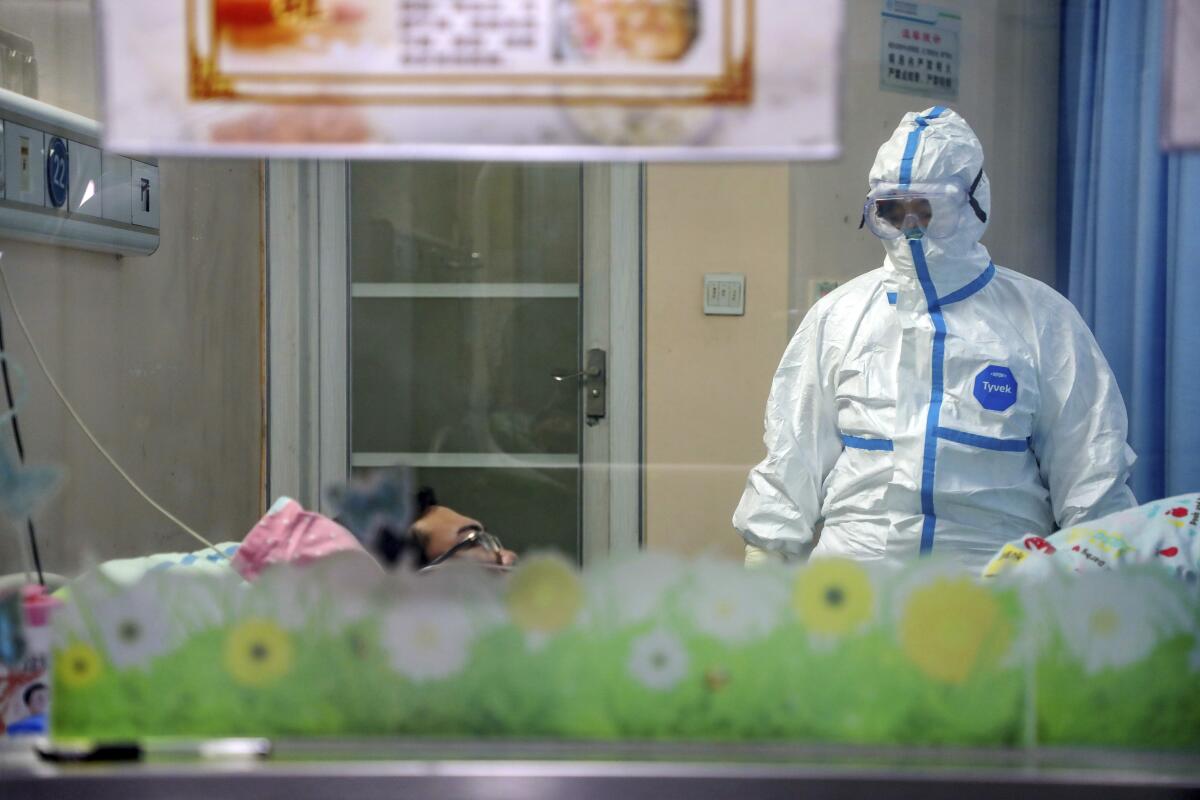
There are also deaths from overwork. They include Song Yingjie, a 28-year-old pharmacist, who was single-handedly managing his hospital’s medicine prescriptions, then checking temperatures at a highway stop at night. He worked until midnight on Feb. 2, standing on the roadside in freezing wind, according to a colleague who was with him. It was his 10th consecutive day on the virus response team.
He was found dead in his hospital dormitory the next afternoon. The cause was cardiac arrest from exhaustion.
Another was Wang Tucheng, 37, a doctor in Henan’s Xinwangzhuang village who was found dead on Feb. 10 in his clinic. His diagnosis was also cardiac arrest due to overwork and fatigue.
In Nanjing, Xu Hui, leader of a hospital’s virus control group, worked for 18 days straight, then went home after a meeting on Feb. 6, “lay down and never got up,” according to state media. She was 51.
Exhaustion is one reason medical workers have high vulnerability to infection, said John Nicholls, a Hong Kong University pathologist who worked on the 2003 SARS outbreak (he never saw deaths from overwork during the fight against severe acute respiratory syndrome, though). Others include lack of training in personal protective equipment, contaminated surfaces, close contact with sick patients, and — perhaps most pertinent to China’s situation — people operating outside their area of expertise.
When SARS broke out, doctors from different departments were asked to join the front lines, Nicholls said. But many medical workers weren’t properly trained for procedures such as intubation in a high-risk infectious disease environment.
In a crisis situation without proper training, medics rushing to the front then easily became infected, and spread infections to others. Nicholls sees a similar pattern with COVID-19.
“I’m not surprised. I’m disappointed that people didn’t learn from SARS,” he said. “The worse thing is once you get an infected healthcare worker, then there’s extra workload on the others.”
“There has to be a sense that only the people trained ... should be allowed to have access, not to allow any people who are willing but maybe not properly trained with the skills,” he said.
China has sent tens of thousands of medical workers from all over the country to bolster relief efforts in Wuhan. It’s a major focus of state propaganda. The narrative features few details on whether the teams receive protective training or other safety measures. Instead, many state videos play inspirational music as doctors and nurses pump their fists, shout patriotic slogans, and prepare for “battle.”
Medical workers’ love for the motherland, Communist Party membership and self-sacrifice have become major propaganda themes after the death of a whistleblower, Dr. Li Wenliang, prompted unprecedented calls for transparency and freedom of speech in China.
But some Chinese feel state media have turned medical workers into props.
One article by the Wuhan Evening News praised a 28-year-old nurse who went back to front-line work 10 days after a miscarriage, calling her a “warrior.” Many online commenters objected.
“Stop this type of propaganda! Stop putting unprotected medical workers on the front line,” one user wrote.
“She is willing to give of herself for the public, the public should protect her rights in return. Our great nation should never allow a vulnerable nurse to look after the patients,” another wrote.
State channel CCTV also aired a report about a pregnant nurse only 20 days from her delivery date but still working in an Wuhan emergency ward, calling her a “great mother and angel in a white gown.”
Internet users, feminists and academics were furious.
“Hospitals should not be allowing a nurse who is nine months pregnant — or the one who’d had a miscarriage — to work. Their immune systems are weakened, and it’s highly possible that they will be infected with the virus,” feminist writer Hou Hongbin told the South China Morning Post.
“These reports are just propaganda.... They’re humiliating these nurses, but they present it as if they are making a sacrifice,” Hou said.
Both nurse stories were deleted after the public backlash.
The language of militaristic sacrifice is obscuring the human value and rights of each individual, said Peking University historian Luo Xin in a recent Chinese podcast that has since been censored online.
“Fundamental laws are broken, basic human rights are destroyed. Why? Because it’s ‘wartime,’” Luo said. “In ‘wartime,’ we can do anything. There is great danger in using this type of language.”
“We are facing humans, not numbers,” he said. “If we can so casually tolerate a few million people making sacrifices for some greater goal, what are we still doing as humans?”
While state propaganda continues to praise heroic sacrifice, one front-line nurse in Wuhan, Long Qiaoling, expressed her feelings in a poem:
Please allow me to remove my protective gear and mask
To separate my flesh from the armor
Let me lean my body down
Let me breathe quietly
Ah….
The slogans are yours
The praise is yours
The propaganda, the model workers, all are yours
I am just fulfilling my duties
Acting on a healer’s conscience
Often, we go bare-skinned into battle
No time to choose between life and death
Truly no high and mighty thoughts
Please don’t give me a wreath
Don’t give me applause....
Media, reporters
Please don’t bother me
The so-called truth, the numbers
I don’t have time or heart to follow
I’m exhausted day and night
To rest, to sleep
Is more important than your praises
If you can, please go and see
Those ruined homes
Is smoke rising from their hearths?
Those scattered phones in the crematorium
Have they found their owners?
Gaochao Zhang and Nicole Liu of The Times’ Beijing bureau contributed to this report.
More to Read
Sign up for Essential California
The most important California stories and recommendations in your inbox every morning.
You may occasionally receive promotional content from the Los Angeles Times.
